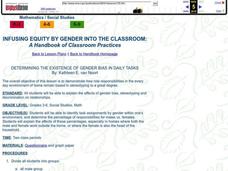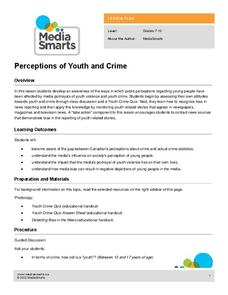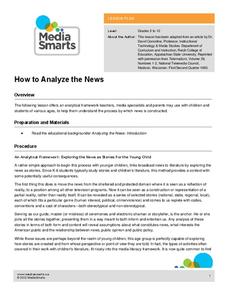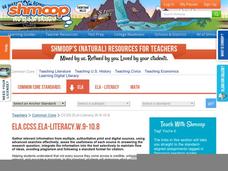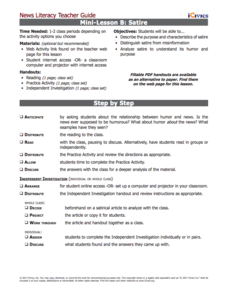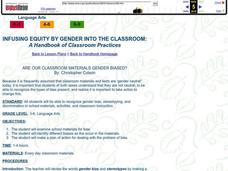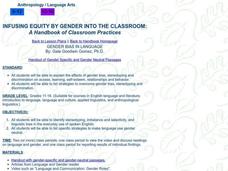Media Smarts
Bias in News Sources
As young consumers of media, it is important for high schoolers to explore concepts of bias and prejudice, and how they may be present in media. After discussing ideological messages that media can contain, individuals complete a warm-up...
Curated OER
Determining the Existence of Gender Bias in Daily Tasks
Help your kids explore gender bias. Learners design and conduct a survey examining role responsibilities within families. They determine the percentage of responsibilities for males vs. females and graph the results. Then they analyze...
iCivics
Lesson 3: Bias
How do journalists balance bias and ethical reporting? The final lesson in a series of five from iCivics examines the different types of bias and how they affect the news we read. Young reporters take to the Internet to find examples of...
Prestwick House
Understanding Language: Slant, Spin, and Bias in the News
We live in a time of fake news, alternative realities, and media bias. What could be more timely than an activity that asks class members to research how different sources report the same topic in the news?
Media Smarts
Bias
See how bias operates firsthand. Half of the class reads one article while the other half reads another article on the same event. The obvious differences emerge when the two sides talk about their observations though. Several handouts...
The New York Times
Evaluating Sources in a ‘Post-Truth’ World: Ideas for Teaching and Learning about Fake News
The framers of the United States Constitution felt a free press was so essential to a democracy that they granted the press the protection it needed to hold the powerful to account in the First Amendment. Today, digital natives need to...
Media Smarts
Perceptions of Youth and Crime
Explore the potential for bias in the news and in scholars' own attitudes and opinions. Begin with a quiz on youth crime to see how learners perceive crime among their peers. After looking at the correct answers, put individuals in...
Curated OER
Looking for Trouble - Using the Internet to Research Structured Controversy
Discuss controversial issues with your charges. More importantly, discuss how you have to research both sides of a controversy before taking a stance. In groups, middle schoolers research the controversial issue of dog sled racing. They...
Curated OER
Stonewall and Beyond: Gay and Lesbian Issues
Help learners understand their own biases and how their perspectives may have been influenced by biased media sources. They keep a journal while viewing videos, exploring websites, and engaging in class discussions related to gay and...
Southern Poverty Law Center
Evaluating Reliable Sources
A lesson plan instills the importance of locating reliable sources. Scholars are challenged to locate digital sources, analyze their reliability, search for any bias, and identify frequently found problems that make a source unusable.
Media Smarts
How to Analyze the News
Teach kids how to watch television, specifically the news, with this creative idea for learners of all ages from the Media Awareness Network. The elementary school plan focuses on presenting news as a story and uses Jon Scieszka's story...
Shmoop
ELA.CCSS.ELA-Literacy.W.9-10.8
Demonstrate the importance of evaluating and citing sources. Pupils can complete the suggested assignment provided here, or one of your choosing, while focusing on checking that the resources are credible and citing those sources...
iCivics
Mini-Lesson B: Satire
Hey, what's so funny? Explore the use of satire in a variety of media with a hands-on lesson. Fourth in a five-part journalism series from iCivics, the activity introduces satirical language in print and online. Pupils work alone or in...
Michigan State University
Researching and Compiling Survey Information
Bring Internet research and social issues to your language arts class in this activity. After investigating the topic "Media Violence and How It Affects Teenagers" on the Internet, middle schoolers work in groups to compile their...
Curated OER
Media Bias
Students analyze mass media to analyze media bias. For this media bias lesson, students read example situations and definitions about media bias. Students read and discuss how to be aware of media bias.
Curated OER
Bias
Students apply techniques of distinguishing between fact and opinion. Students identify words associated with persuasion and argument. Students read and categorizer a variety of newspapers and articles. Students identfy bias in a...
Curated OER
Are Our Classroom Materials Gender Biased?
Students explore equality by analyzing their own classroom belongings. In this gender bias lesson, students investigate their classroom and identify objects as either male or female biased. Students collaborate while exploring the idea...
Curated OER
Persuasive and Emotive Language Lesson Plan
Young scholars explore persuasive language. In this emotive language lesson, students consider the use of language that incites readers as they participate in reading and writing activities that require them to describe a tourist...
Curated OER
Fact and Opinion Lesson Plan
How are fact and opinion different? Middle schoolers explore fact and opinion and write articles pertaining to a football match, eliminating all opinion statements in order to focus on the facts. Then they discuss bias in the media....
Curated OER
Loose Lips
Have your middle and high schoolers analyze instances of celebrities using racial slurs or making prejudiced comments in public. After reading an article, they consider the roots and effects of prejudice and bias. As a class, they...
University of North Carolina
Psychology
Psychology, the scientific study of the human mind and behavior, is a popular major for many college students. An informative handout outlines common assignments in psychology courses. Scholars see how to design a research proposal,...
Curated OER
Slanted Sentences
Students examine biased words in news articles, suggest synonyms, then rewrite the sentences to demonstrate how word choice can alter meaning.
Curated OER
Can We Switch Genders of Story Characters?
Students read and review the main elements of a story. In this language arts lesson, students predict what the story read to them would have been like if the genders of the characters had been different. Students write a new story in...



